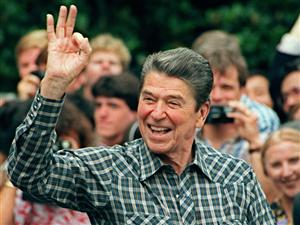RONALD REAGAN: ILLUMINATI TOOL
February 6, 2011

The Reagan myth is still useful to the Illuminati in duping and misdirecting people who hold traditional values.
by Rollin Stearns
(for henrymakow.com)
The past few days have seen a burst of contrived media celebration of Ronald Reagan. The excuse has been the 100th anniversary of his birth.
The real reason is that Reagan -- the Reagan myth -- is still useful to the Illuminati in duping and misdirecting people who hold traditional values.
In truth, Reagan was an enemy of these values. He was a highly paid puppet of the Illuminati who let himself be used by those who want to destroy everything he pretended to stand for.
I have to admit he had me fooled too. Back in 1980, people wanted to be rid of the feckless Jimmy Carter. Reagan seemed strong and sincere, upbeat and conservative. To me, he seemed like a man you could trust.
A big mistake. Unfortunately, he's still got most people fooled. So let's review the career of Ronald Reagan, and see who the real man was.
THE REAL REAGAN
First, Reagan was a left-wing Democrat who admired Franklin Roosevelt, the president who revolutionized America by turning the Republic into an Empire. (See Burden of Empire by Garet Garrett.) Even to the end of his career, Reagan was praising Roosevelt.
Later, about the time he divorced his first wife (Jane Wyman) and met Nancy Davis (the daughter of one of Eleanor Roosevelt's intimates), he underwent a "conversion" to "anti-communism." This was the foundation of his reputation as a conservative.
No surprise here, though. In the late 1940s, lots of left-wing liberals were turning against the Communists -- many to save their own skins from the revelations of treason that were coming out.
Even when this was not the motive, their "anti-Communism" often meant no more than anti-Stalinism. Trotskyites -- who thought of themselves as true Communists -- hated Stalin's guts and hated the Soviet Union. Later, many of them became the so-called "neo-conservatives" who took over Buckley's National Review, and then, with the election of Reagan, the Republican Party.
But what about Reagan's opposition to the "evil empire"? What about his big defense build-up that forced the Soviet Union into insolvency? What about his partnership with John-Paul II to free Poland and Eastern Europe?
All this was just part of the Illuminati plan to take the dialectic (capitalist West vs. communist East) to the next level. Gorbachev and Reagan were the appointed leaders to bring about the end of the bipolar world, so that the age of globalization could emerge.
In fact, at their summit at Reykjavik in 1986, Reagan proposed to Gorbachev that America be radically disarmed. Even liberals were stunned by the scope of Reagan's offer.
But behind the scenes, the American military rebelled, and the accounts of the summit were sanitized and forgotten. The following year Reagan gave his "Mr. Gorbachev, tear down this wall" performance and when the wall did come down, Reagan became "the man who defeated Communism."
ILLUMINATI GO'FER
Reagan's "patriotism" suffered other lapses as well. In 1986 he signed off on amnesty for millions of illegal aliens. You would think as a man of common sense and alleged economic literacy, Reagan would have known that when you reward something, you get more of it. Was the Gipper out to lunch?
And then there was "Iran-Contra." Reagan was fearlessly fighting the Commies in Central America, but didn't know that Ollie North was selling arms to Iran to finance this holy war. Out to lunch again?
It was at this point that I ceased to be a "conservative." All the conservatives I knew seemed to be gaga over North. Where I come from, his actions are known as treason.
 (An aside: Fawn Hall,left, North's personal secretary -- a sensitive position that is carefully vetted -- was the daughter of Henry Kissinger's personal secretary. And Reagan had put Kissinger in charge of Central American policy.)
(An aside: Fawn Hall,left, North's personal secretary -- a sensitive position that is carefully vetted -- was the daughter of Henry Kissinger's personal secretary. And Reagan had put Kissinger in charge of Central American policy.)CHAMPION OF SMALL GOVERNMENT
But what about other Reagan policies? Didn't he reduce taxes? Didn' t he reduce the size of government to "get it off our backs," as he pledged?
Reagan's career was the triumph of rhetoric over reality. When he ran for President, he promised to put an end to the Departments of Education and Energy. Instead, he strengthened and entrenched them. (He also added a new bureaucracy, the Department of Veterans Affairs.)
As for taxes, he cut them in 1981 -- one of his signature accomplishments. But the same year he increased Social Security taxes (excuse me, I mean "insurance premiums"), and in the following years he found other ways to raise taxes without seeming to do so. At the end of his two terms most Americans were paying more in taxes than ever.
After eight years of Reagan the government was larger than ever. The budget was more than 50 percent higher than it was under Carter. And the budget deficit had tripled.
This was due above all to the huge increase in military spending. The military-industrial complex (that Eisenhower had warned against) thrived as it hadn't since the days of World War II.
CHAMPION OF CHRISTIAN VALUES
Wasn't Reagan pro-life? A Christian? A family man? Once again, when it came to things like abortion, Reagan talked a great game. But his Supreme Court Justices gave us Roe v. Wade).
His first appointment was an unqualified woman (O'Connor) with little judicial experience and no discernible judicial philosophy. She was selected for the same reason that Sotomayor and Kagan were: she was a female. And she was no conservative.
In all, Reagan appointed three justices. Later, two of them (predictably including O'Connor) voted to uphold Roe v. Wade in Casey v. Planned Parenthood. (Casey was a critical case: a change in just one of those two votes would have undermined Roe.)
And then there was the Bork nomination. Robert Bork was the most qualified nominee in a generation. But when Teddy Kennedy launched his breathtakingly vitriolic attack on Bork, what did Reagan do?
Nothing. He remained silent. The man who extolled the presidency as a great "bully pulpit" -- who might have saved his own nominee if he had just fought for him -- instead let him hang out to dry.
So there we have Reagan -- the man who as Governor of California signed the first no-fault divorce bill into law; the man whose official schedule was set by his wife according to astrological conjunctions; the man whose whole political career was subsidized by global corporations (GE, Bechtel, etc.) -- the man who spent his whole life play-acting a script written by others.
Was he evil? Did he know what he was doing? Or was he truly out to lunch? The latter might explain Reagan's uncanny ability to seem anti-government even as he enlarged the government's role.
CONCLUSION
What was Reagan's overriding role? And why does it matter now? Picture two men, one at each end of a cross-cut saw. They're cutting down a tree.
To the casual observer it looks at first as if the two are working against each other: as one moves forward, the other goes back, and vice versa. But of course they're working together to achieve a common goal.
In the same way, "liberals" and "conservatives," Republicans and Democrats, seem to be working against each other. But they're really working together.
One part will move the country to the left, when the times permit (e.g., because of depression or war). Then, when people become alarmed and resist the move, the other ("opposition") party will come in.
But instead of restoring the balance, they will merely stop (or slow) the leftward movement. They will consolidate it, until it's time for the next move left.
In this way the center of gravity moves ever leftward. And what was unthinkable a generation ago becomes mainstream today.
To enact this little dialectic you need some good (or passable) actors, such as Ronald Reagan. That way you control the opposition. You get people who have traditional values to vote for their own destruction.
----
Rollin Stearns is a former book editor who lives in Maine.
Further reading: Here's the Rest of Him (1968) and The Counterfeit Candidate (1976), both by Kent Steffgen.
Related- The Corruption of Ronald Reagan by Dan Moldea







Tony B said (February 8, 2011):
I'm surprised that neither book editor Stearns nor any responders seem aware that Reagan - waaaaaaay back in his early acting days - was a charter member of the United World Federalists. That "leopard" never changed his spots.